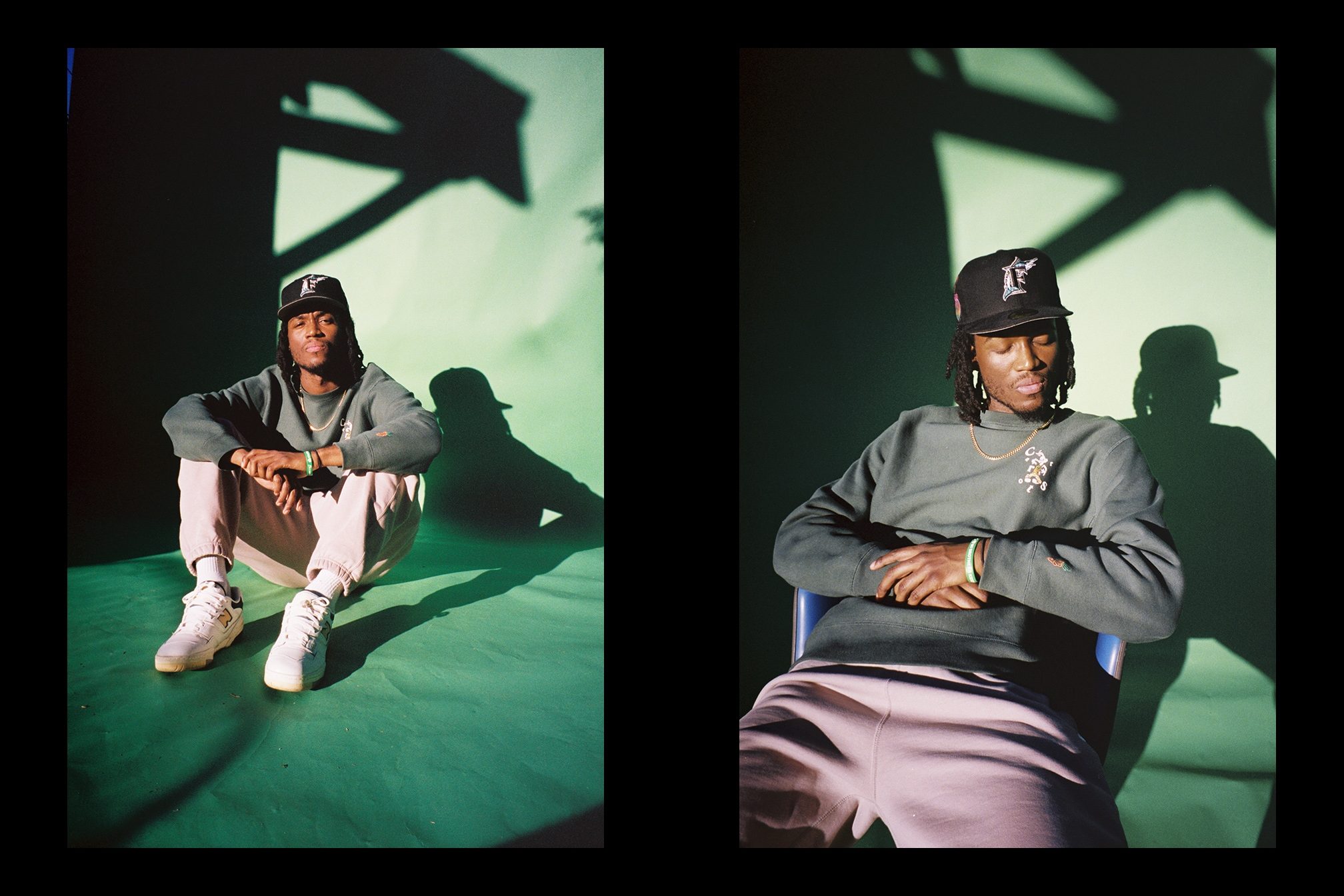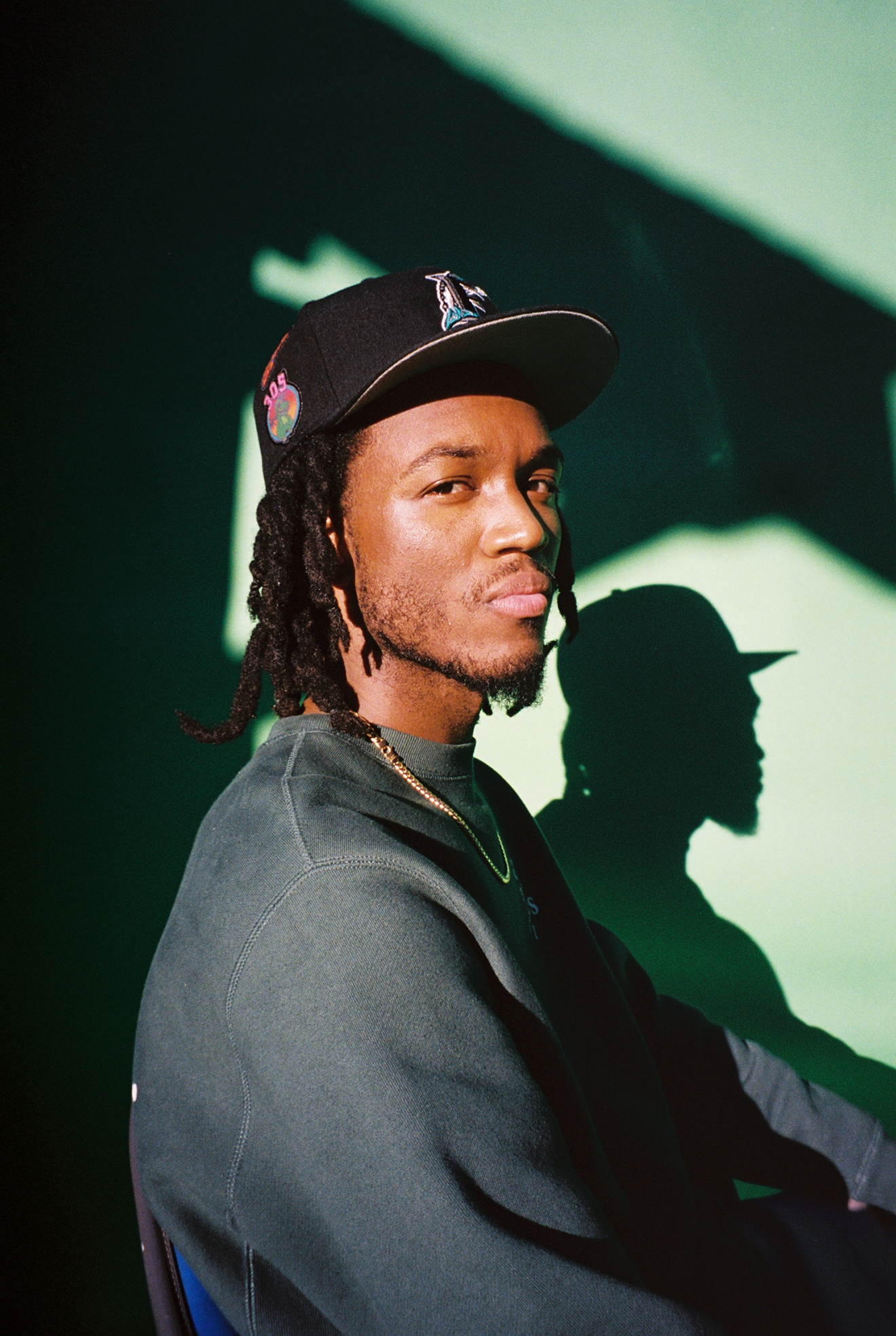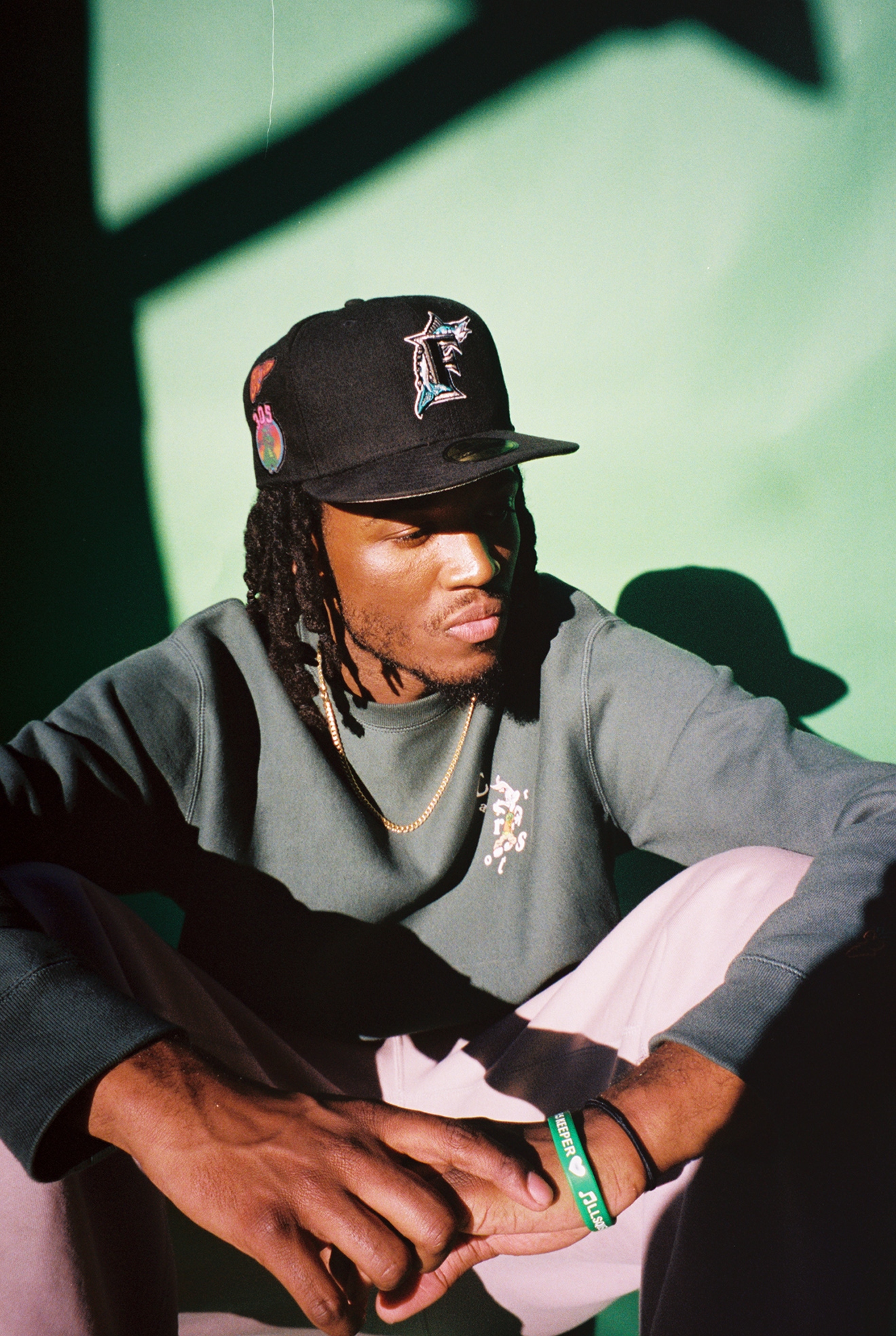 Features
Features
How opening up to his emotions helped Saba make his best album yet
Aneesa Ahmed speaks to Chicago rapper Saba about his ever-evolving artistry and the new heights he hits on his latest album 'Few Good Things'
“I think the most important thing that I've learned and where my maturity most shows itself is being comfortable in being wrong,” Saba tells Mixmag with confidence over Zoom. He's not wrong when he proudly declares his latest album, ‘Few Good Things’, as the “most complete version of himself, being presented on a plate”. In making the album, the Chicago-hailing rapper forced himself to feel uncomfortable, faced up to his own emotions and learned to appreciate how change can be good. Now at the stage of feeling confident within himself and with a greater understanding of what it means to be an artist and a person, his growth means he’s only going to keep on thriving.
Progression can be traced through each of his three albums, ‘Bucket List Project’, ‘CARE FOR ME’, and newly released ‘Few Good Things’. They've evolved sonically through xylophone-rap to grittier-lyricism to neo-soul infusion, and lyrically, each project has seen Saba become more assured in his feelings and his own emotional journey — all while embracing chaos and using it to represent himself in the present. While all three bear introspection, emotion, and commentary and recounts of the working-class Black experience, ‘Few Good Things’ has an elevated sense of maturity and variety. On top of that, it features Bone Thugs-n-Harmony‘s Krayzie Bone, one of his long-time idols — it’s no wonder “this is the project [he’s] most proud of, ever.”
“But,” he's quick to explain, “it didn’t happen overnight, this was a process.” The 27-year-old started his musical experimentation in his early teen years when he began messing about with sounds in his grandma’s basement in West Side Chicago, going on to perform at youth arts groups YouMedia Centre (Chicago) and Young Chicago Authors at age 16. Almost involuntarily, he then became part of a larger network of artists and rappers in Chicago, all of whom were championing a DIY style and a community-based approach in the rap game.
Read this next: Freddie Gibbs is conquering hip hop on his own terms
“That core group from Chicago, who were in the group from 2012 to around 2016, damn that means everything. We cultivated a community and a sound and got national recognition and attention for it,” Saba say. Here, he’s referring to Smino and Noname (both of whom he started supergroup Ghetto Sage with), Chance The Rapper (who helped launch Saba’s career by featuring him in track ‘Everybody's Something’ from seminal 2013 mixtape ‘Acid Rap’) and members of his own rap collective Pivot Gang, which includes the likes of his brother Joseph Chilliams (AKA Jerrel Chandler), his late cousin John Walt, the late SqueakPIVOT, MFnMelo, Frsh Water, Daoud, Dam Dam and Daedae. The deaths of his cousin John and of Squeak are central themes of his albums ‘CARE FOR ME’ and ‘Few Good Things’ — the journey of grieving someone close who you lost before their time and living with survivor’s guilt are explored throughout.
These friends have now become long-time collaborators, and many of them are regular features in his albums and tracks. Since starting out as a young rapper in 2012, Saba has collaborated with the likes of Denzel Curry and Tobi Lou, but he credits his friends from his teenage years as his favourite collaborations. “The most important features that I'll ever have will be my friend group from 10 years ago - you know Noname and Chance and Mick [Jenkins] and Smino etcetera,” he says. “That’s what pushes the sound, music, and culture of community values forward in a way that sounds original and authentic”. As Saba recounts the several successes of his friends and their lives, he reiterates that they “all learn from each other”.
“We’re like distant cousins,” he laughs. “None of our music really sounds the same, but it’s still connected.” While the many of Saba's peers from his youth club days have gone their separate ways — Noname runs a socialist and feminist reading club, Joey Purp makes rap that pays homage to Chicago's historic house culture — Pivot Gang is tight-knit and united in the aim to of utilising liberation-minded lyrical poetry. They all return as a collective in ‘Few Good Things’ on the track ‘Soldier’, after ‘You Can't Sit With Us’, their first full-length release which amassed huge support.

Despite this journey, Saba doesn’t believe that he has been in the rap game for 10 years, nor does he believe he’s still in it. From growing in Chicago to now living in LA, his journey keeps unfolding. More recently he’s managed to gain a better understanding of how he perceives art, rap and emulation. “The exciting thing about the Saba sound is that it can be anything! I go in with no intentions, but when I know what I want, I know what I want,” he says assuredly.
One point that he emphasises is that he does not shy away from some of his major influences, such as fellow Chicago-originating rapper Kanye West and his all-time idols Bone Thugs-n-Harmony. “The more comfortable I get, the more established my own sound gets, the more assured I feel. I can make the same beat as someone but no matter how hard I try it will never sound exactly like them, it will be like me, it will have all of my quirks.” His recent album showcases this: it has the grooves, cadence and rhythm of Bone Thugs-n-Harmony; and despite containing numerous features from artists who span different sounds, from 6LACK to G Herbo to Mareba, it has a consistent flair of soul-infused melodies, incisive lyricism and artistic flow that can be directly attributed back to Saba.
Read this next: Radical Black rap music needs to be protected from gentrification
Saba raps about both the Black experience and his relationship with Black excellence. Existing in a structurally racist society comes with its trials, and he conveys these through his music. “I don’t necessarily rap about a universal human experience, but I definitely rap about the universal Black experience,” he explains. He has a more nuanced relationship with what he believes Black excellence to be: “[For Black excellence], there's always a sacrifice to be made when it comes to financial gain, some compromise always has to be made.” The variety of factors to consider has created a multifaceted view of what this term means in his mind. “I’m just rapping how I go about it and experiencing it though.”
Despite noting that his perspective means that “there's stories that I say that people across the world will never be able to relate to” on one level, Saba thinks his genuine delivery is able to connect universally: “they can relate to me as a human because it's not the act — it's the emotion attached to it.” His music is anecdotal but reflects themes such as the realities of struggling within a capitalist world (“tryna finesse Uber with a new email, CTA short - balling on a budget” he raps in ‘Bucket List Project’s ‘Stoney’); dealing with all-consuming emotional experiences (“We cannot bear all of the fucked up shit we been through, Why God keeping us here?”, he raps in ‘CARE FOR ME’s ‘CALLIGRAPHY’); and the realities of keeping up with a fast-changing world (“Fake it 'til you make it camouflaging all facades”, he raps in Denzel Curry featuring track ‘Something in the Water’). Saba champions the idea that he makes music about the Black experience, but music that can also speak to working class and struggling individuals universally through opening conversation and evoking emotion: “I didn’t necessarily want to put my values on anybody. My values can change, I’m more just trying to have an open dialogue about it.”

All of his albums, at least for him, are “time capsules, glimpses into everyday life and where you are right there and then”. ‘Few Good Things’ is an extension of that. “This album is me being very emotionally aware, and telling that story, and just telling kind of where my mind is. There are also moments of pure uncertainty. And I didn't want to edit that out.” He deals with tough themes such as having to come-of-age and grow up while your surroundings and environment are perpetually violent, all while grieving loved ones gone too soon. In ‘CARE FOR ME’ we saw him handle these topics by crescendoing into a state of anger and hurt but then plateauing into despondency, before repeating that cycle. On ‘Few Good Things’, Saba is more vulnerable in admitting that he’s dealing with these complex emotions, which comes through lyrically and sonically in the experimental nature of a track like ‘Survivor's Guilt’.
A turning point for Saba was when he found the quote from an interview with The Roots where the members say that they aim to lose around 40% of fans with every album that comes out. “That was really important to me. They’re some of the best to ever do it and they said they want to lose fans. It made me…understand artistry. I see albums such as ‘Yeezus’ or ‘To Pimp a Butterfly’, which are a bit more leftfield to what fans were expecting, and I understand why they did it now,” he says with conviction. It’s clear through our conversation that this is a concept that he has pondered a lot, and a goal that he carries forwards. “One of the things I’m proud of about myself is that you can press play and not know what to expect, and that’s exciting. I’m happy about that.”
Read this next: Free Thebe: Earl Sweatshirt is coming into his own
‘Few Good Things’ is taking Saba to a new level and is allowing him to evolve in different ways. The shift in sound and poetic penmanship is additionally accompanied by a short film. Directed by C.T. Robert, it provides an audio-visual addition to the themes explored in the album such as nostalgia, home, belonging and growth. “I wanted to step it up and take a concept from A to B, I didn’t want to answer questions, I wanted to pose questions. I wanted to create a generational experience with this album, and this film just furthers that”, he explains.
The album has a very intergenerational element to it, as seen by his grandpa featuring as the cover image, poised in front of Saba’s great-grandmother’s home, and the several references to family in the lyrics. Laced with archival conversations, anecdotal recounts and samples from his catalogue of tracks; the film is a stunningly shot and edited picture depicting the scenes of Chicago where he grew up. Gorgeous cinematography takes watchers through the streets of West Side Chicago and to house formerly lived in by Saba’s grandmother, 12 years after the family lost the home, and we see it almost as if we're experiencing it through the eyes of a child growing up there. “This felt right, like every creator, we wanted to take a creative project to a new level. Like, oh you made a music video? What’s next, a short film. Unlike the other projects, we had more resources and time on our hands to be able to make this.”
Finally reaching a stage of comfort in himself and his abilities, he’s ready for what is yet to come. “There’s always versions of myself that will grow, it always makes me excited. I’m now thinking 'damn the next one is gunna be crazy.'” Saba is excited to be back on stage, a place where he “feels most at ease”. Now that he is completely himself, refusing to be restricted to a particular style and insisting on delivering his narrative in his own terms, for Saba, “the possibilities are endless.”
‘Few Good Things’ is out now, check it here
Aneesa Ahmed is Mixmag's Digital Intern, follow her on Twitter


